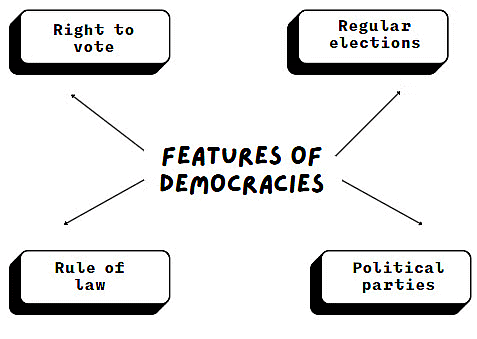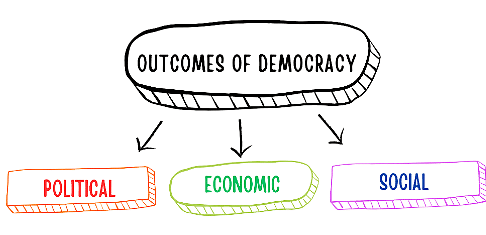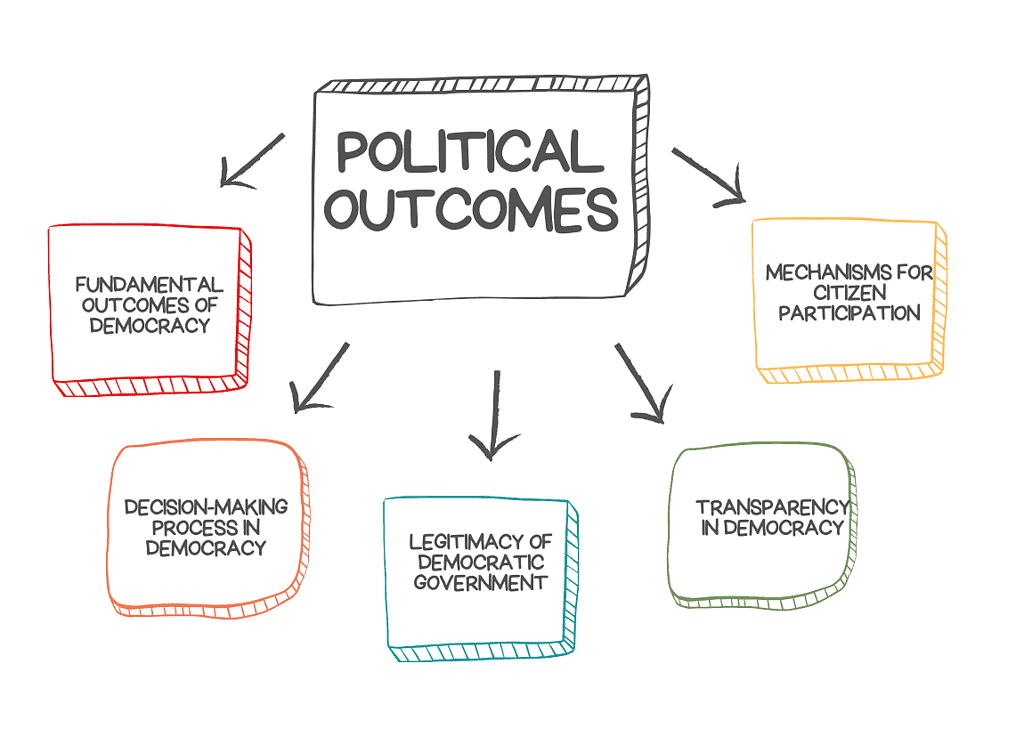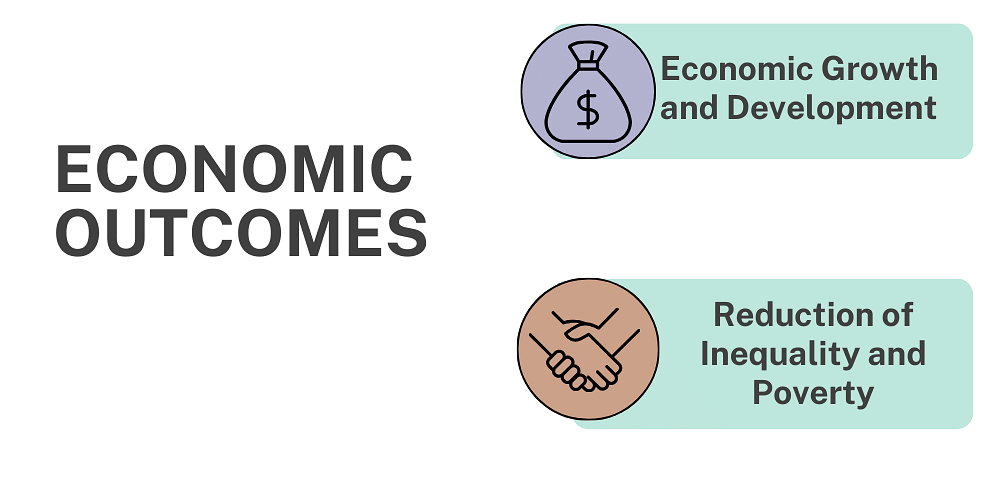Class 10 Civics Chapter 5 Notes - Outcomes of Democracy
Introduction
The chapter "Outcomes of Democracy" explores the impact and effectiveness of democratic governance on various aspects of society.
Democracy is a system where ultimate power rests with the people, who participate in decision-making through voting and electing representatives.
 This political structure emphasizes:
This political structure emphasizes:
- Individual Freedoms: Ensuring that citizens have the liberty to express themselves and make choices.
- Equal Representation: Providing fair and equal voice to all citizens in the political process.
- Protection of Human Rights: Safeguarding fundamental rights and freedoms for every individual.
How Do We Assess Democracy's Outcomes?
Common features of democracies:-
- Regular elections: In a democratic government, general elections are held to elect a new government.
- Right to vote: All the citizens of the country, of and above a certain age, have the right to vote.
- Political parties: political parties are an essential part of democracy. They put up candidates who contest the election.
- Rule of law: Another common feature of all democracies is that it ensures rule of law. Law is supreme and all citizens are equal in the eyes of law. No one is above the law.
Democracy is a better form of government when compared with dictatorship or any other alternative form of government.
- Promotes equality among citizens.
- Enhances the dignity of the individual.
- Improves the quality of decision-making.
- Provides a method to resolve conflicts.
- Allows room to correct mistakes.
Practical Dilemma: [Principle vs. Practice] Democracy is valued in principle but often criticized in practice. Many support democratic ideals but may be dissatisfied with its execution.
Democratic Variations:
- Global Practice: Over a hundred countries practice various forms of democracy, with differences in social, economic, and cultural contexts.
- Expectation vs. Reality: Achievements in democracy vary widely; expectations may not always align with outcomes.
Understanding Democracy:
- Not a Panacea: Democracy provides a framework but does not automatically solve all issues. Citizens must actively engage with and utilize democratic processes to achieve desired results.
Accountable, Responsive and Legitimate Government
The Political Outcomes can be defined using five basic points which can be understood as:

I. Fundamental Outcomes of Democracy
- Right to Choose and Control: Citizens should have the right to elect their rulers and influence their decisions.
- Participation: Citizens should be able to engage in decision-making that affects them.
- Accountability: Governments must be answerable to the people.
- Responsiveness: Governments should address the needs and expectations of citizens.
II. Decision-Making Process in Democracy
- Deliberation and Negotiation: Democracy is built on the principles of deliberation and negotiation.
- Procedural Approach: Democratic governments follow procedures, making their decisions both acceptable and effective.
III. Mechanisms for Citizen Participation
- Decision-Making Involvement: Democracy allows citizens to participate in the decision-making process.
- Essential Practices: Free and fair elections, open debates on policies, and the right to information are vital for accountable democracies.
IV. Transparency in Democracy
- Procedural Norms: Democracy ensures that decisions follow established procedures, and citizens have the right to understand and scrutinize these processes.
- Lack of Transparency in Non-Democracies: Non-democratic regimes often lack transparency.
V. Legitimacy of Democratic Government
- People’s Government: Despite imperfections, democratic governments are considered legitimate as they are elected by the people.
- Global Support: Democracy is widely supported worldwide, reflecting its perceived legitimacy and acceptance among citizens.
In essence, democracy is not just a form of government; it is a system designed to ensure accountability, responsiveness, transparency, and the active participation of citizens in decision-making, making it a legitimate and widely supported governance model.
Economic Growth and Development
I. Connection Between Democracy and Economic Growth
- Over the past five decades, dictatorships have exhibited a slightly higher economic growth rate compared to democracies.
- Various factors influence a country's economic growth, including population size, global circumstances, cooperation from other nations, and the economic priorities adopted by the country.
- Despite a marginal disparity in economic growth rates between dictatorships and democracies, favoring democracy is advisable due to its additional positive outcomes, such as upholding the dignity and freedom of citizens.
II. Correlation between Democracy and Development
- Democracies are anticipated to foster development, influenced by factors like population size, global conditions, and cooperation from other countries.
- In democracies, decision-making involves discussion and deliberation, making it a slower but just and appropriate process.
- The deliberate nature of democracy ensures fairness in the pursuit of development goals.
Economic Outcomes of Democracy

The following points show the relationship of democracy with economic growth and economic inequalities:
- The dictatorial regime has had a slightly better record of economic growth. But when we compare their record only in poor countries, there is virtually no difference.
- There can be a very high degree of inequalities within democracies.
- There is often inequality of opportunities available to the poorer sections of society.
Reduction of Inequality and Poverty
Expectations from Democracy:
- Economic Equity: Democracies should ideally reduce economic disparities and ensure fair distribution of wealth and opportunities.
- Economic Growth vs. Inequality: Economic growth in democracies does not always translate into reduced inequalities; it can sometimes lead to greater disparities.

Current Reality:
- Wealth Distribution: A small fraction of the population often holds a disproportionate share of wealth, while those at the lower end face increasing economic difficulties.
- Basic Needs: Individuals at the bottom of the economic ladder struggle to meet basic needs such as food, housing, education, and healthcare.
Democratic Effectiveness:
- Political Equality vs. Economic Inequality: While democracies promote political equality through voting rights, they may not effectively address economic inequality.
- Government Response: Democratically elected governments may not prioritize poverty reduction as expected, despite the large proportion of poor voters.
Global Context:
- Poverty in Poor Countries: In some countries, such as Bangladesh, a significant portion of the population lives in poverty. Many poor nations rely on aid from wealthier countries for essential supplies.
Accommodation of Social Diversity
Democratic Approach: Democracies manage social diversity by providing mechanisms to handle conflicts and encourage respect for differences. They aim to balance majority rule with minority rights.
Key Conditions for Effective Democracy:
- Majority-Minority Cooperation: Majority rule should involve collaboration with minorities, ensuring all voices are considered.
- Inclusivity: Democracy must avoid dominance by any single group; all citizens should have the opportunity to influence decisions.
Examples:
- Belgium: Successfully manages ethnic diversity through federalism, which provides autonomy to different linguistic regions, reducing conflict.
- Sri Lanka: Despite being a democracy, faced ethnic conflict due to inadequate inclusion of minority grievances, highlighting that democracy needs to ensure true representation and respect for all groups.

Dignity and Freedom of the Citizens
Democracy's Promotion of Dignity and Freedom:
1. Individual Dignity and Freedom:
- Democracy is considered superior for promoting the dignity and freedom of individuals.
- Conflicts often arise due to perceived lack of respect, and democracy addresses these concerns.
2. Passion for Respect and Freedom: The foundation of democracy lies in the shared passion for respect and freedom among individuals.

3. Global Recognition of Principles: Democracies worldwide, at least in principle, recognize the importance of individual dignity and freedom.
4. Degrees of Recognition: Various democracies have achieved different degrees of recognizing the principles of dignity and freedom.
5. Challenges in Recognizing Equality: Societies historically built on subordination and domination find it challenging to accept the equality of all individuals.
Challenges and Achievements in Democracy:
1. Dignity of Women:
- Historical male-dominated societies have faced challenges in recognizing the dignity of women.
- Women's struggles have led to increased sensitivity towards the respect and equal treatment of women in democratic societies.
2. Legal and Moral Foundations:
- The legal and moral force supporting individual freedom and dignity is stronger in democracies, providing a basis to challenge unacceptable practices.
3. Caste Inequalities in India:
- Democracy in India has strengthened the claims of disadvantaged castes for equal status and opportunity.
- Instances of caste-based inequalities lack strong moral and legal foundations in a democratic setup.
Expectations and Continuous Evaluation of Democracy:
1. Unending Examination of Democracy:
- Democracy is distinctive in that its examination is ongoing; as it passes one test, new challenges emerge.
- People's increasing awareness and expectations contribute to the continuous evaluation of democracy.
2. People's Complaints as a Sign of Success:
- Public complaints about democracy indicate its success.
- Dissatisfaction demonstrates that citizens have developed awareness and the ability to critically assess those in power.
3. Transformation from Subjects to Citizens:
- Public dissatisfaction signifies the success of democracy, transforming people from subjects to engaged citizens.
4. Belief in the Impact of Voting:
- Most individuals believe that their vote makes a difference in how the government operates and influences their self-interest.
In summary, democracy's emphasis on dignity, freedom, and continuous evaluation by an engaged citizenry marks its success in transforming societies and addressing diverse challenges.
|
64 videos|445 docs|87 tests
|
FAQs on Class 10 Civics Chapter 5 Notes - Outcomes of Democracy
| 1. What are the key outcomes of democracy? |  |
| 2. How does democracy contribute to economic growth? |  |
| 3. In what ways does democracy help reduce inequality and poverty? |  |
| 4. Why is the accommodation of social diversity important in a democracy? |  |
| 5. How does democracy enhance the dignity and freedom of citizens? |  |




















